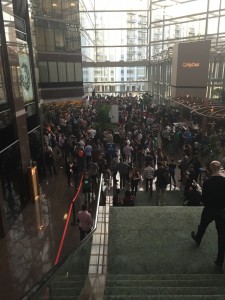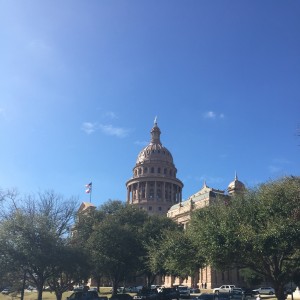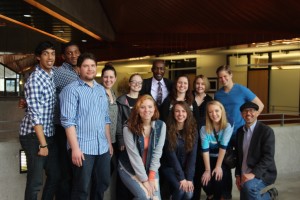It was another great day in Austin for these Michiganders! We started out early again, for a meeting with the city manager and assistant city manager of Austin. Even though our meeting was only about six miles away, we had to leave about 45 minutes before because of the traffic in Austin. Talking to Marc Ott and Sue Edwards, we found out that traffic and infrastructure is one of Austin’s biggest downfalls. It was really great to talk to both Marc Ott and Sue Edwards; they both had some great insights on what was going on as far as startups go in Austin and it was fun to hear Marc’s thoughts because he was previously the city manager in Kalamazoo.
One thing that really struck me was that they wanted to blur the lines between public and private sectors. This was not something I had previously heard at other places. I liked the reasoning that Mark and Sue gave though; it is important for entrepreneurs to take any support they can get, no matter public or private. They believe at Austin City Hall that if there are enough ideas and connections, anything can happen. This is also true of their thoughts on innovation. Mark said that he believes that innovation is not always something completely new. To him, innovation can be taking something that already exists and changing the way that people think about it. I thought this was really important for entrepreneurs because in many cases, they are using technology that already exists, but in a completely new way.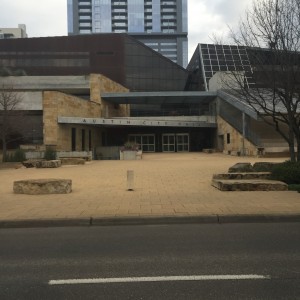
Next, we drove to our top secret location for lunch, a cemetery to meet with Jason Black. Jason is the founder of several companies, including his newest, Wee Golf. We met at the cemetery so Jason could give us a lesson in both life and entrepreneurship. Jason wanted us to realize that our lives are entirely consistent of the dash between the dates (on headstones). Though I’m sure we’d all heard something like this before, it was really impactful to hear it in the cemetery when we were surrounded by people who had lived out their dashes. Jason also told us that it would be in our best interest to follow our passions, because that is what would make us the happiest and most successful. However, he said that this could take many years for us, but that we should never give up on finding our passions. To help along the way, he recommended that we find multiple mentors, though they can also change during the journey, The point is really to find a support group that will stand behind you and your ideas no matter what.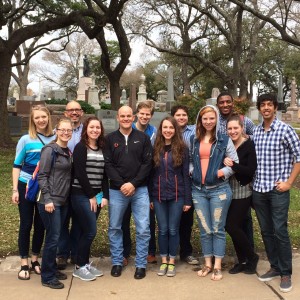
After our meeting with Jason, we went to speak with a founder of People Pattern, a company that specializes in finding the best locations to place ads and the best people to use them on. There, we talked to Ken Cho, a founder, and Jason Baldridge, a professor at the University of Texas and linguistics expert. Together, they told us that some of the biggest things to them that were crucial to startup communities were culture, transparency, government, creativity, low(ish) cost of living, sense of community and access to capital and other resources, among other things. To me, this fit in really well with the framework the class created before embarking on this journey. To Ken, People Pattern is all about a new way of thinking with an older technology, analyzing data.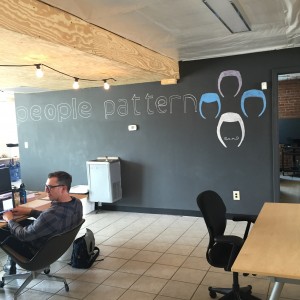
I found People Pattern to be a very cool and hip company. I loved East Austin, where it was located, because of its street art and culture of being young and informal. People Pattern was also very attractive to me because of the way it was started, through bootstrapping. Though not always in agreement from what we have learned, I believe bootstrapping is one of the most important things for startups to do. It seems to make the founders more passionate about what they’re doing, especially because the money doesn’t really matter to them, but the idea does. However, Ken told us that doing things this way was really hard, saying “It’s not all ping pong and Pimm’s cups” because it isn’t all fun and easy. I also really liked that Professor Baldridge was willing to take a couple of years off from teaching to work on the startup because it showed that was really where he wanted to be, in the startup community and making a difference in the world.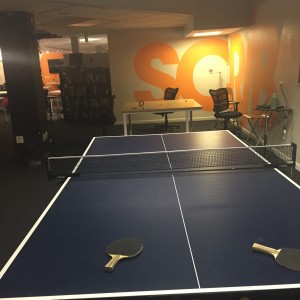
Finally, some of us rounded out the day by visiting Capital Factory, a stop on the SXSW Startup Crawl. There, we saw many startup companies working to grow their apps and products and got to meet some people in the community while seeing what Austin was all about. With so many people and events, Austin is a thriving community that easily welcomes newcomers and entrepreneurs of all shapes and sizes, another aspect that we believe is important to startup communities.
